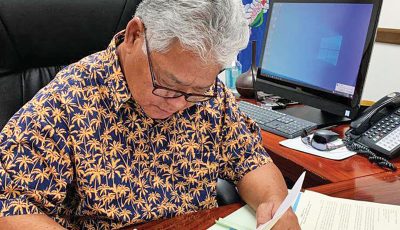Senate unanimously passes own version of budget bill
Senate counsel says only governor has authority to allocate, expend ARPA money
With the backing of their legal counsel’s opinion stating, among other things, that it is only the governor who has the authority to allocate or expend the American Rescue Plan Act funds, the Senate Friday unanimously passed their version of a budget bill for the government’s operations for Fiscal Year 2023.
With all eight senators present voting “yes” during a session held at the Tinian courthouse, the Senate passed House of Representatives Bill 22-116, HD2, in the form of Senate substitute 1.
It was only Sen. Paul A. Manglona (Ind-Rota) who was absent from the session. Sens. Teresita A. Santos (Ind-Rota) and Edith E. DeLeon Guerrero (D-Saipan), who appeared at the session through Zoom, voted “yes” for the passage of the Senate’s substitute budget bill.
The Senate’s version of the budget now goes back to the House for action.
Gov. Ralph DLG Torres has until Oct. 1, 2022 to enact a new budget bill into law or risk a potential shutdown of government operations during an election year.
Last Aug. 27, the House passed budget bill 22-116 in the form of HD2, to appropriate $109.7 million out of $150.4 million in total budgetary resources, and $52.6 million from the American Rescue Plan Act funds, for CNMI government operations in Fiscal Year 2023.
During Friday’s discussions of the budget bill, Senate Fiscal Affairs Committee chair Sen. Victor B. Hocog (R-Rota), who offered the substitute bill, said instead of taking the 80% of the local available resources, the House made an amendment to do a reversal.
Hocog said the House took the ARPA money to fund the salaries of fulltime employees at 80% and use the local available funds to fund the remaining 20%.
He said the committee members are very concerned by the House’s action.
Hocog said the committee also found out that the available submission for legislative action from ARPA provided only $32 million to support the 80% from the general fund.
He said the action that the House did by using the 20% of the local funds to fund other departments locally and using ARPA 80% does not hold any continuing employment to all the government employees that are being paid today under Fiscal Year 2022 under the local funds.
“And that uncertainty really puts all government employees in jeopardy in the following fiscal year,” he said.
Hocog said Torres already came out in his press release, advising all the retirees that they will be guaranteed payment for the first quarter, but yet the House submitted $13 million in their version to fund the 25% pension benefits and not considering the commitment that the governor has put out already to pay the retirees 25% for the first quarter.
During discussions, Senate President Jude U. Hofschneider (R-Tinian) enumerated further some of the “products” that they received from the House’s budget bill version.
Hofschneider said according to the information and the guidance from the Legislature’s fiscal analyst, the House budget bill version completely defunded the Marianas Visitors Authority for the entire fiscal year.
He said the amount of public agency employees that stand to potentially lose employment, amounts up to almost $20 million.
“That’s $20 million that can potentially be spread in the community by way of employment of some of these employees,” the Senate president said.
Hofschneider said he appreciates the diligence of the Senate Fiscal Affairs Committee and the guidance by their legal counsel and fiscal analyst, and agencies that have guided the committee to figure out a way and mechanism to reverse many actions done on the House budget bill version.
“I couldn’t help but to point out the timeframe that the Senate was given to work on this [budget bill],” he said.
The Senate president noted that the House received the governor’s proposed budget submission last April 1 and that there were subsequent minor amendments to the revenue projection.
He said the House never acted on a product until Aug. 27, or merely 30 days for the Senate to look into what was done.
“If my recollection serves me right, it’s supposed to be before the governor’s desk already so they can start reviewing the actions of the budget. But that’s all out the window right now obviously,” Hofschneider said.
He said they can only hope that the Senate product that they are about to dispose of is understood.
In response to Sen. Santos’ questions before the voting, Senate legal counsel Joe Bermudes said it appeared to him that the House relied on this provision, 1 CMC 7204 in the Planning and Budget Act, to support their position that they can add two riders on the budget bill.
Bermudes said the House members tried to fit that provision to their argument that ARPA is additional revenue.
He said the House members are taking in their context that this provision is a statutory provision that refers to Commonwealth revenues and nothing else.
Bermudes said the House members completely ignored the constitutional provision under NMI Constitution under Article 2 Section 5, which is the one subject rule “because maybe, perhaps, this provision cannot be reviewed by the judicial branch.”
He said moreover, the most glaring, ignorant action by the House is based on Article 3, Section 9 (a) provision that mandates the governor to submit a balanced budget.
Bermudes said in that provision, it allows the governor to recommend and include legislation with respect to legislation for taxation.
“What they didn’t look at is the analysis. If you just read that, they tried to fit it into a statutory provision,” he pointed out.
Bermudes said the constitution provides that the budget plan submitted by the governor may include legislation with respect to taxation.
He said the constitution, however, states that revenue bills are passed separately from the budget for the Commonwealth.
Bermudes said to anybody that reads that, it only means one thing: that the House cannot make the sugar tax and tobacco tax—a rider in the budget bill.
Rep. Leila Haveia Fleming C. Staffler (D-Saipan) acknowledged during a recent press conference that incorporating taxes provision in a budget bill has not been done before in the CNMI, but that it does not mean it’s unconstitutional or illegal.
The House Ways and Means Committee decided to add two provisions in the budget bill that would increase taxes on tobacco and sugar sweetened beverages for fiscal year 2023.
House majority members stated that they consulted their counsel for legal opinion. Joe Taijeron is the House’s legal counsel.
After Friday’s passage of the Senate budget bill version, Sen. Santos said that if the Senate substitute bill is rejected by the House, she appeals to the Senate and House committees’ conferees to immediately meet and deliberate and find a way to compromise and pass the FY ’23 budget on time to avert a government shutdown.
“Our people have suffered immensely throughout this pandemic and we are only beginning to recover from this ordeal,” she said.
The senator said now is not the time and would be extremely irresponsible of the lawmakers to burden the people, the CNMI, with a government shutdown that will financially impact the people.
“Let us burn the midnight oil in order to produce a compromised version of the Fiscal Year 2023 budget so we can transmit it to the governor for action and avert any shutdown,” Santos said.
She said every year, the Legislature and administration are pressed with identifying funding to operate the CNMI government that also includes local matching of the CNMI Medicaid, retirees pension of 25%, payments for government retirees’ defined contributions, insurances, etc.
Santos told Saipan Tribune yesterday that the House being cognizant of these concerns, has rejected the use of general funds to satisfy these agencies and resorted to using ARPA to fund 80% of the salaries of personnel under the Executive and Municipalities of Rota and Tinian.
Santos said during Friday’s session she proceeded to inquire from their legal counsel Bermudes if ARPA funds are included under Section 7204 of the Planning and Budgeting Act to which he replied “no.”
She said based on their counsel’s legal opinion, it is only the governor who has the explicit authority to expend or allocate those ARPA funds.
Santos said therefore, the Senate substitute bill reverted the House version and instead funded the salaries under the executive and municipalities at 80% general fund and 20% ARPA as submitted by the administration.
Santos said similarly, the House allocated the Compact Impact Funds to certain entities to which she also inquired if such is covered under Section 7204, the Planning and Budget Act, but again Bermudes replied “no.”
“Based on our legal counsel’s opinion, it is only the governor that has the authority as it is based on data and etc.,” Santos said.
Santos said lastly, the House made a rider the sugar sweetened and tobacco tax in their version of the budget bill, to which she asked why such provision was deleted by the Senate.
She said based on Bermudes’ legal opinion, it is not in conformance with the one subject one title rule.



























